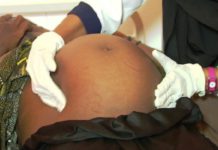
You probably know that having unprotected sex can lead to getting pregnant. But how long does it take to get pregnant after sex?
We know that sex leads to pregnancy, but how soon after sex could you really get pregnant? The answer isn’t exact. It’s actually a range—it could be within minutes or could take a few days.
According to research, implantation can take up to two weeks to occur after having sex without using a birth control method. Although this method might sound like a long time, let’s define a few terms and explore the steps from sexual intercourse to implantation (pregnancy) in a little more detail:
- You’re in your “fertile window”
Your fertile window is the time during the month when you can conceive; this is roughly an 8-day window.
It starts about a week before ovulation (when your ovaries release an egg, and it’s available to be fertilized for up to two days).
Sperm cells can survive in the female reproductive tract for almost a week, which allows sperm from sex you have a week before ovulation to still be able to swim up to meet the egg once it’s released.
- You have unprotected sex
This allows the sperm to get near the egg. “Unprotected” means having penis-in-vagina sex (or even penis-vagina contact) without using birth control or without reliably using birth control.
That means, for example, if you take your pill most of the time but missed it for a few days or are a couple of weeks late in getting your birth control shot, you’re technically having unprotected sex and can get pregnant.
- Fertilization occurs
Fertilization is when the sperm meets the egg and fertilizes it, turning it into an embryo. It can happen as soon as a few hours after sex (if you’re ovulating at the time and the sperm are real go-getters) or up to a week after having sex (if you had sex before actually ovulating).
- Implantation occurs
Implantation is when the fertilized egg moves to the wall of the uterus and attaches itself, which is the scientific definition of pregnancy.
This can take up to a week after fertilization happens. Within a few weeks, your pregnancy hormone levels rise enough that you may feel some early pregnancy symptoms like fatigue or cramping.
This all means that, in total, you can get pregnant (i.e., the embryo implants in your uterus) anywhere from within hours of having sex to two weeks after having sex.
Does age play a role in how quickly one conceives?
Age does seem to play a role in how long it takes to get pregnant. Over age 35, the rate of conception for women begins to decline.
Interestingly, one study showed that the length of the monthly fertile window itself didn’t change for women below age 40 but did show that the overall chances of getting pregnant do decrease above age 35. Fertility for men is less affected by age than in women but does decline by the late 30s.
How to improve your chances of getting pregnant?
If you’re trying to conceive, there are a few things you can try to increase your chances of getting pregnant:
- Have sex every day in your fertile window
Many people wonder how often they should have sex to get pregnant.
Having sex frequently during your fertile window may help maximize your chances of becoming pregnant. It’s a common misconception that abstaining from sex improves sperm quality.
However, if having sex that often feels stressful, don’t worry—your chances of getting pregnant are nearly as good if you just have sex 2–3 times per week during your fertile period.
- Optimize your health
You can help ensure that your body is ready to take on the demands of pregnancy—and increase your fertility—by keeping healthy and nourishing your reproductive health.






